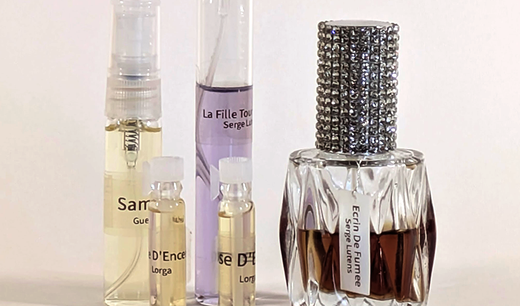
How to Store Your Perfume Decants
Share
If you're a perfume enthusiast or collector, chances are you own a variety of decants and samples. These smaller bottles are perfect for exploring new scents, traveling light, or sharing fragrances with friends. However, their compact size and delicate nature make them more susceptible to damage and deterioration if not stored properly. To help you keep your treasured scents fresh and long-lasting, here’s a comprehensive guide to storing your perfume decants and samples.
Why Proper Storage Matters
Perfume is a delicate product made up of a complex blend of ingredients, including essential oils, alcohol, and fixatives. These ingredients can break down over time when exposed to certain environmental factors, such as light, heat, and air. This degradation not only affects the fragrance’s composition but can also shorten its lifespan. Proper storage helps preserve the scent’s integrity and ensures that your decants and samples remain as fresh and vibrant as the day you received them.
Factors That Affect Perfume Longevity
To store your perfume decants and samples effectively, it’s essential to understand the factors that can impact their longevity:
1. Light Exposure
UV light is one of the biggest enemies of perfume. It can break down the molecular structure of the fragrance, leading to altered scents and discoloration. This is particularly problematic for clear or lightly tinted bottles.
2. Heat and Temperature Fluctuations
High temperatures and frequent temperature changes can cause the alcohol in perfumes to evaporate faster, leading to a loss of top notes and a weakened overall scent. Ideally, perfumes should be stored at a consistent temperature between 60°F and 70°F (15°C to 21°C).
3. Air Exposure
When air enters a perfume bottle, it can oxidize the fragrance, altering its composition and reducing its longevity. Decants and samples are particularly vulnerable to this due to their smaller size and sometimes less secure closures.
4. Humidity
Excess humidity can degrade perfume labels, corrode metal atomizers, and introduce moisture into the bottle, which can compromise the fragrance.

Practical Tips for Storing Perfume Decants and Samples
Choose the Right Storage Location
The best place to store your perfumes is in a cool, dark, and dry area. Consider the following locations:
- A Drawer or Closet: These spaces are typically shielded from direct sunlight and temperature fluctuations.
- A Plastic Storage Box: Control evaporation by storing your decants in plastic bags or airtight boxes.
- A Dark Corner of a Room: Keep them in a dark space that does not get window light, away from any heat or air conditioning sources.
Use Protective Packaging
If your decants and samples are in fragile glass bottles, consider additional packaging to protect them:
- Wrap bottles in bubble wrap or tissue paper to prevent breakage.
- Use small, padded pouches or travel cases to keep them secure.
- Store them upright to minimize the risk of leakage.
Minimize Air Exposure
- Ensure caps and atomizers are tightly closed after use.
- Transfer perfume into high-quality, airtight decant bottles if the original sample packaging is prone to leakage.
- For larger decants, consider using a refillable atomizer with a secure pump mechanism.
Avoid Bathrooms and Windowsills
Bathrooms may seem like a convenient storage spot, but the high humidity and fluctuating temperatures can accelerate perfume deterioration. Similarly, windowsills expose perfumes to direct sunlight and heat, making them less than ideal for storage.
Long-Term Storage Solutions
For collectors or those with a large number of decants and samples, long-term storage requires extra care:
Invest in UV-Protective Glass
Some decant bottles come with UV-protective glass, which can shield your fragrances from light exposure. If your decants are in clear glass, consider transferring them to amber or cobalt blue bottles for added protection.
Vacuum Seal for Rare Fragrances
For extremely rare or vintage fragrances, consider vacuum-sealing the bottles in plastic to prevent air and moisture from entering. This is particularly useful for samples you want to preserve for years.
Final Thoughts
Storing your perfume decants and samples properly doesn’t have to be complicated. By understanding the factors that affect perfume longevity and taking simple preventive measures, you can preserve the beauty and quality of your fragrances for years to come. Whether you’re a seasoned collector or new to the world of perfumes, these storage tips will ensure that your favorite scents remain a source of joy and inspiration every time you reach for them.
Remember, each decant and sample is a small treasure. Treat them with care, and they’ll reward you with their enduring charm.
